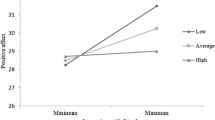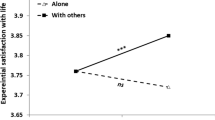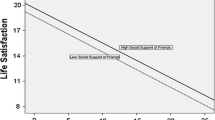Abstract
Research suggests that family and friend support differentially impact well-being, although relatively few studies investigate how these relationships function day-to-day. The first goal of the study was to explore how interactions with family and with friends related to individuals’ daily experience of positive and negative emotion. The second goal of the study was to determine whether the perception that others were available to provide a particular type of support moderated the relationship between friend and family support and well-being each day. Multilevel Random Coefficient Modeling illuminated these linkages in data from 96 participants from Successful Aging in Context: The Macroenvironment and Daily Lived Experience (M Age = 67 years, SD Age = 4.9 years; range 58–86 years). Results revealed significant relationships between affect balance and satisfaction with the amount of support provided by family and by friends; in general, older adults reported a higher ratio of positive to negative affect on days they were more satisfied with the amount of support received from each source. Results of Level-2 analyses suggested that the perception that others were available to provide tangible assistance strengthened the relationship between satisfaction with family support and daily well-being; likewise, the availability of emotional support and advice strengthened the daily friend support–affect balance association. Overall, results suggest that global perceptions that network members are available to provide different types of support differentially augment the relationships between the social support older adults receive from friends and family each day and well-being; in so doing, these results suggest ways in which older adults can benefit most from existing support.
Similar content being viewed by others
Notes
It should be noted that the factor loading for the advice/coping factor exceeds one for the item “Some to give you good advice about a crisis”. Although this may indicate a Heywood case [i.e., an instance where a unique variance estimate is on the boundary of 0 (Lawley and Maxwell 1971)], this was not the case in the current analyses; the residual variance for this item was estimated to be .26 and no errors or warning messages were obtained from the iterative-based estimation procedure that was used in Mplus. Instead, this factor loading likely indicates that the communality (shared variance between an item and the associated latent factor) is close to 1.0 (van Driel 1978), which seems reasonable given the close relation between the item (i.e., “Some to give you good advice about a crisis”) and the latent factor (i.e., advice/coping).
References
Baltes, P. B., & Baltes, M. M. (1990). Psychological perspectives on successful aging: The model of selective optimization with compensation. In P. B. Baltes & M. M. Baltes (Eds.), Successful aging: Perspectives from the behavioral sciences (pp. 1–34). Cambridge: Cambridge University Press. doi:10.1017/CBO9780511665684.002.
Carstensen, L. L., Pasupathi, M., Mayr, U., & Nesselroade, J. R. (2000). Emotional experience in everyday life across the adult life span. Journal of Personality and Social Psychology, 79(4), 644–655. doi:10.1037//0022-3514.79.4.644.
Charles, S. T. (2010). Strength and vulnerability integration: A model of emotional well-being across adulthood. Psychological Bulletin, 136(6), 1068–1091. doi:10.1037/a0021232.
Charles, S. T., Luong, G., Almeida, D. M., Ryff, C., Sturm, M., & Love, G. (2010). Fewer ups and downs: Daily stressors mediate age differences in negative affect. The Journals of Gerontology Series B: Psychological Sciences and Social Sciences, 65, 279–286. doi:10.1093/geronb/gbq002.
Charles, S. T., Reynolds, C. A., & Gatz, M. (2001). Age-related differences and change in positive and negative affect over 23 years. Journal of Personality and Social Psychology, 80, 136–151. doi:10.1037/0022-3514.80.1.136.
Cohen, S., & Syme, L. (1985). Issues in the study and application of social support. In S. Cohen & L. Syme (Eds.), Social support and health (pp. 3–22). New York: Academic Press.
Cornwell, B. (2011). Age trends in daily social contact patterns. Research on Aging, 33, 598–631. doi:10.1177/0164027511409442.
Deiner, E., Suh, E., Lucas, R. E., & Smith, H. L. (1999). Subjective well-being: Three decades of progress. Psychological Bulletin, 125(2), 276–302. doi:10.1037//0033-2909.125.2.276.
Depner, C. E., & Ingersoll-Dayton, B. (1988). Supportive relationships in later life. Psychology and Aging,. doi:10.1037/0882-7974.3.4.348.
Diehl, M., Hay, E., & Berg, K. M. (2011). The ratio between positive and negative affect and flourishing mental health across adulthood. Aging and Mental Health, 15, 882–893. doi:10.1080/13607863.2011.568488.
Felton, B. J., & Berry, C. A. (1992). Do the sources of urban elderly’s social support determine its psychological consequences? Psychology and Aging, 7, 89–97. doi:10.1037/0882-7974.7.1.89.
Fernandez-Ballesteros, R., Zamarron, M. D., & Ruiz, M. A. (2001). The contribution of socio-demographic and psychosocial factors to life satisfaction. Ageing and Society, 21(01), 25–43. doi:10.1017/s0144686x01008078.
Fredrickson, B. L., & Losada, M. F. (2005). Positive affect and the complex dynamics of human flourishing. American Psychologist, 60, 678–686. doi:10.1037/a0034435.
Haber, M. G., Cohen, J. L., Lucas, T., & Baltes, B. B. (2007). The relationship between self-reported received and perceived social support: A meta-analytic review. American Journal of Community Psychology, 39, 133–144. doi:10.1007/s10464-007-9100-9.
House, J. S., & Kahn, R. L. (1995). Measures and concepts of social support. In S. Cohen & L. Syme (Eds.), Social support and health (pp. 83–108). New York: Academic Press.
Jones, D. C., & Vaughan, K. (1990). Close friendships among senior adults. Psychology and Aging, 5, 451–457. doi:10.1037/0882-7974.5.3.451.
Kahn, J. H., Hessling, R. M., & Russell, D. W. (2003). Social support, health, and well-being among the elderly: What is the role of negative affectivity? Personality and Individual Differences, 35, 5–7. doi:10.1016/S0191-8869(02)00135-6.
Komproe, I. H., Rijken, M., Ros, W. J., & Winnubst, J. A. (1997). Available support and received support: Different effects under stressful circumstances. Journal of Social and Personal Relationships, 14, 59–77. doi:10.1177/0265407597141003.
Lakey, B., & Cassady, P. B. (1990). Cognitive processes in perceived social support. Journal of Personality and Social Psychology, 59, 337–343. doi:10.1037/0022-3514.59.2.337.
Lawley, D. N., & Maxwell, A. E. (1971). Factor analysis as a statistical method. London: Butterworth.
Lucas, R. E., Diener, E., & Suh, E. (1996). Discriminant validity of well-being measures. Journal of Personality and Social Psychology, 71, 616–628. doi:10.1037/0022-3514.71.3.616.
Merz, E., & Consedine, N. S. (2009). The association of family support and wellbeing in later life depends on adult attachment style. Attachment and Human Development, 11, 203–221. doi:10.1080/14616730802265185.
Montpetit, M. A., Kapp, A., & Bergeman, C. S. (2015). Financial stress, neighborhood stress, and well-being: Mediational and moderational models. Journal of Community Psychology, 43, 364–376. doi:10.1002/jcop.21684.
Muthén, L. K., & Muthén, B. O. (1998–2012). Mplus user’s guide (7th ed.). Los Angeles, CA: Muthén & Muthén.
Nezlek, J. B. (2001). Multilevel random coefficient analyses of event- and interval-contingent data in social and personality psychology research. Personality and Social Psychology Bulletin, 27, 771–785. doi:10.1177/0146167201277001.
Nezlek, J. B. (2003). Using multilevel random coefficient modeling to analyze social interaction diary data. Journal of Social and Personal Relationships, 20, 437–469. doi:10.1177/02654075030204002.
Pinquart, M. (2001). Age differences in perceived positive affect, negative affect, and affect balance in middle and old age. Journal of Happiness Studies, 2, 375–405. doi:10.1023/A:1013938001116.
Pinquart, M., & Sorensen, S. (2000). Influences of socioeconomic status, social network, and competence on subjective well-being in later life: A meta-analysis. Psychology and Aging, 15, 187–224. doi:10.1037/0882-7974.15.2.187.
Raudenbush, S. W., & Bryk, A. S. (2002). Hierarchical linear models: Applications and data analysis methods (Vol. 1). Thousand Oaks, CA: Sage.
Rook, K. S. (1984). The negative side of social interaction: Impact on psychological well-being. Journal of Personality and Social Psychology, 46, 1097–1108. doi:10.1037/0022-3514.46.5.1097.
Russell, A., Bergeman, C. S., & Scott, S. B. (2012). Daily social exchanges and affect in middle and later adulthood: The impact of loneliness and age. International Journal of Human Development, 74, 299–329. doi:10.2190/ag.74.4.c.
Russell, D. W., & Cutrona, C. E. (1991). Social support, stress, and depressive symptoms among the elderly: Test of a process model. Psychology and Aging, 6, 190. doi:10.1037/0882-7974.6.2.190.
Scholz, U., Kligel, M., Luszczynska, A., & Knoll, N. (2012). Associations between received social support and positive and negative affect: Evidence for age differences from a daily diary study. European Journal of Aging, 9, 361–371. doi:10.1007/s10433-012-0236-6.
Schwarzer, R., & Leppin, A. (1991). Social support and health: A theoretical and empirical overview. Journal of Social and Personal Relationships, 8, 99–127. doi:10.1177/0265407591081005.
Sherbourne, C. D., & Stewart, A. L. (1991). The MOS social support survey. Social Science and Medicine, 32, 705–714. doi:10.1016/0277-9536(91)90150-b.
Siedlecki, K. L., Salthouse, T. A., Oishi, S., & Jeswani, S. (2014). The relationship between social support and subjective well-being across age. Social Indicators Research, 117, 561–576. doi:10.1007/s11205-013-0361-4.
Thoits, P. A. (1995). Stress, coping, and social support processes: Where are we? What next? Journal of Health and Social Behavior,. doi:10.2307/2626957.
Uchino, B. N. (2009). Understanding the links between social support and physical health: A life-span perspective with emphasis on the separability of perceived and received support. Perspectives on Psychological Science, 4, 236–255. doi:10.1111/j.1745-6924.2009.01122.x.
Van Driel, O. P. (1978). On various causes of improper solutions in maximum likelihood factor analysis. Psychometrika, 43, 225–243. doi:10.1007/BF02293865.
Watson, D., Clark, L. A., & Tellegen, A. (1988). Development and validation of brief measures of positive and negative affect: The PANAS scales. Journal of Personality and Social Psychology, 54(6), 1063–1070. doi:10.1037/0022-3514.54.6.1063.
Wolff, J. K., Schmiedek, F., Brose, A., & Lindenberger, U. (2013). Physical and emotional well-being and the balance of needed and received emotional support: Age differences in a daily diary study. Social Science and Medicine, 91, 67–75. doi:10.1016/j.socscimed.2013.04.
Acknowledgments
The authors would like to thank Janette Abbasi, Madelyn Daly, Annmarie Gast, Tanya Gupta, Nathalie Macias, Lauren Nielsen, Jairo Rosales, and Margaret Stanielun for their contributions to the conception of this project.
Author information
Authors and Affiliations
Corresponding author
Ethics declarations
This study has been approved by the Illinois Wesleyan University Institutional Review Board, which ensures ethical treatment of human subjects. As part of said ethical treatment, informed consent was obtained from each participant for both aspects of the study (i.e., questionnaire and daily components).
Rights and permissions
About this article
Cite this article
Montpetit, M.A., Nelson, N.A. & Tiberio, S.S. Daily Interactions and Affect in Older Adulthood: Family, Friends, and Perceived Support. J Happiness Stud 18, 373–388 (2017). https://doi.org/10.1007/s10902-016-9730-4
Published:
Issue Date:
DOI: https://doi.org/10.1007/s10902-016-9730-4




